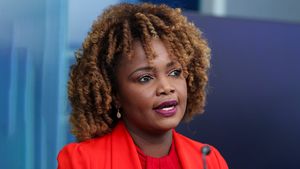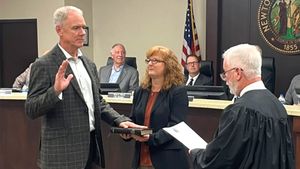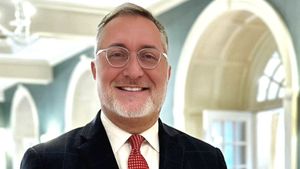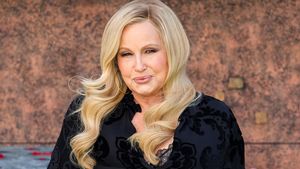When Greg Mathis Jr. came out on national television — on his family’s reality series Mathis Family Matters — he had an idea in mind for how best to use his newfound platform. The son of Judge Greg Mathis, best known for his long-running syndicated courtroom reality show, Judge Mathis, Mathis Jr. knew he wanted to be a representative not only for the LGBTQ+ community, but also for those living with HIV.
Mathis Family Matters, which just aired its first season in 2022 and is available to stream on Peacock TV and various other streaming platforms, introduced Mathis Jr. to life on a more public scale. His coming out storyline on the show culminated with Elliott Cooper, Mathis Jr.’s longtime boyfriend, asking for his hand in marriage in front of the whole family in the season finale.
He, of course, said yes.
 Greg Mathis Jr. and Elliott Cooper photographed by Momodu Mansaray for Getty Images
Greg Mathis Jr. and Elliott Cooper photographed by Momodu Mansaray for Getty Images
A breakaway star from the show, Mathis Jr. hit the ground running as a leading voice for LGBTQ+ causes. He joined forces with foundations like the Elizabeth Taylor AIDS Foundation as an advocate for those living with and susceptible to HIV, a topic that hits close to home.
Although Mathis Jr. spent some time working at the U.S. Senate learning about policies and how they’re implemented, his support for the HIV community was inspired by his Uncle Steve, who passed away due to complications from HIV and cancer.
“It’s always been a really important issue for our family, even before me coming out publicly as gay [on Mathis Family Matters], something that we’ve kind of taken on as a family,” Mathis Jr. tells Plus. “But my new platform and coming out publicly as gay has given me an opportunity to really take this issue on in a much more direct way…even beyond my uncle.”
That direct way led him to headlining the 30th annual AIDSWatch Rally on Capitol Hill in March alongside John Roberts (Bob’s Burgers) and Daniel Franzese (Mean Girls, Looking). Mathis Jr.’s participation in the rally was on behalf of Us Helping Us and the National Gay Men’s Advocacy Coalition’s work to support Black LGBTQ+ people in advocacy and leadership.
 Mathis Family Values cast photographed by Matt Winkelmeyer for Getty Images
Mathis Family Values cast photographed by Matt Winkelmeyer for Getty Images
On leading the rally, Mathis Jr. said, “I think when I look around my friend group, we’re impacted and it’s all around us. So knowing that there really is an opportunity for us to end this epidemic, and that the focus is on testing, treatment, prevention, and the community work that we could do to get rid of this epidemic once and for all. It really made me want to be more outspoken and more active on these issues, and to do my part to make sure that folks are learning more about this.”
As to how AIDSWatch tapped him as the leader of the rally, Mathis Jr. said he’d posted something on social media in regard to key dates for various HIV/AIDS awareness days, and someone reached out to him to gauge his interest.
“I jumped at the opportunity,” he said, noting that the work was similar to a “really exciting” partnership he had with the Elizabeth Taylor AIDS Foundation on HIV Is Not a Crime Awareness Day in February.
“I think folks saw my work on that day, in addition to some other things that I did that led to an opportunity to be active in this conference here, which I’m really excited about because they haven’t done it since 2019. Not only is it the 30th anniversary [of the rally], it’s coming back for the first time since the pandemic — which is really exciting because I know how important it is to get on Capitol Hill and have these conversations.”
 Mathis Jr. in Washington, D.C.
Mathis Jr. in Washington, D.C.
Reflecting on his own time in D.C., Mathis Jr. says, “I worked down there for 10 years, and I know that if you aren’t making your views known, if you aren’t telling the people who represent you the resources that you need and what’s important to you, it has a high probability of falling completely by the wayside because there’s so many other competing priorities in D.C.”
Upward of 300 volunteers also joined the rally, which partially influenced something Mathis Jr. wanted to address in his speech.
“I wanted to talk about the importance of people using their voice, because at this rally, there [were] people there who are living with HIV, those of us who are vulnerable, and everyone in between. I really wanted to impress upon folks the importance of using your voice to advocate for the resources that we need to end this epidemic. Like I said before, we are so close to ending this epidemic once and for all.”
The addition of the volunteers at the rally made work like going door-to-door, state-to-state, and talking to congressional representatives about those resources more feasible. The issues were also presented directly to those representatives to make sure they were educated on the topics.
“The issues that get the most attention are the ones that staffers and the representatives hear the most about. Oftentimes, in my experience, you hear from large companies who can afford to hire big fancy lobbyists and fly people into D.C. and talk about the issues that are important to them. But maybe those aren’t always the issues that are impacting marginalized communities.”
 Mathis Jr. and Cooper photographed by Presley Ann by Getty Images for Google Pixel
Mathis Jr. and Cooper photographed by Presley Ann by Getty Images for Google Pixel
“When I worked on Capitol Hill, I was a health policy advisor to Senator Mark Warner [of Virginia] on the Finance Committee,” he adds. “We did a lot of work with Medicare and Medicaid and those programs, the Ryan White HIV AIDS program, and learning how close we are to really ending this pandemic. I mean, the science is there, the prevention is there. Everything we need is there. The only thing that’s missing is the public education and the community work to get people comfortable with where we need to go.”
With the knowledge and everything needed at our fingertips, Mathis Jr. hopes there will be additional investment in community resources so people can have the education needed to make the best decisions for their sexual health.
That said, he noted, “If you’re having unprotected sex in the gay community, particularly as a gay Black man, you probably want to be protecting yourself somehow, for sure.”
Within the education and treatment department, Mathis Jr. also says addressing stigma and discrimination head-on are key factors to winning the fight against HIV, too.
“We worked on highlighting the issues around HIV criminalization and how that contributes to stigma and people not wanting to get treatment. I saw my uncle go through that, just being afraid to talk about his diagnosis [or] to seek treatment at times because of the fear of being criminalized or treated differently. So that is absolutely one of the big pushes that we need to make. And one of the things that we need to deal with is reducing stigma so that people feel comfortable getting the care that they need, and also openly having those conversations about prevention is necessary as well.”
 Cover photo by Tommy Garcia / E Entertainment / NBCU Photo Bank via Getty Image
Cover photo by Tommy Garcia / E Entertainment / NBCU Photo Bank via Getty Image
From Your Site Articles
Related Articles Around the Web
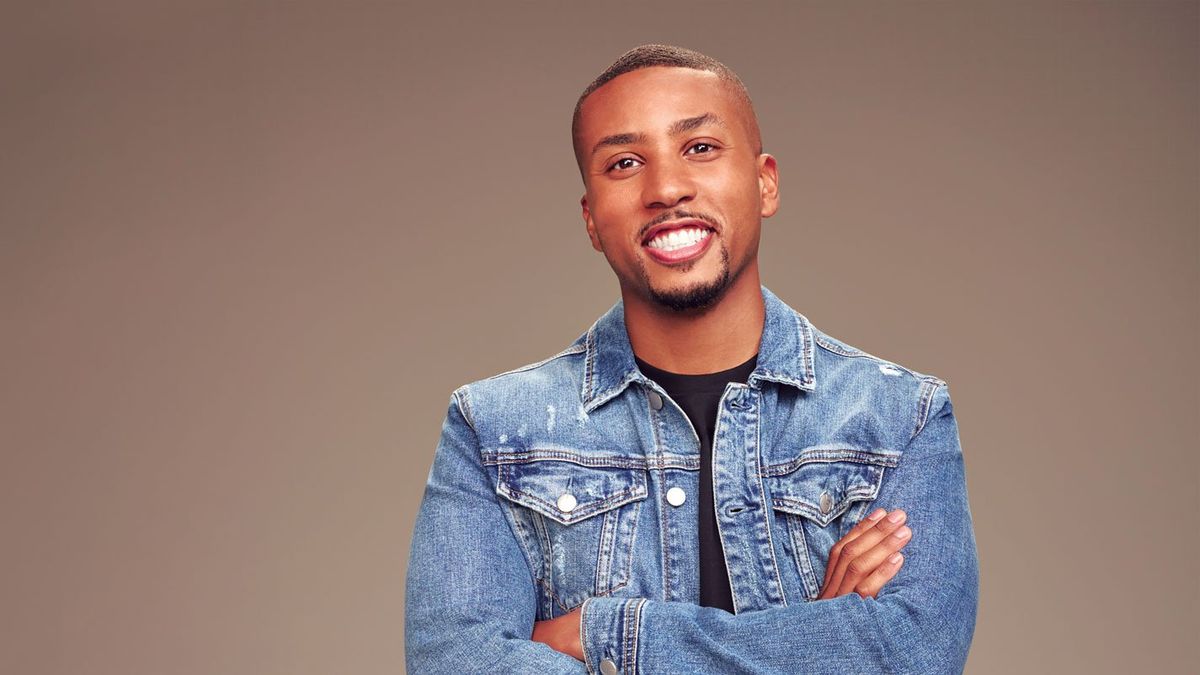
 Greg Mathis Jr. and Elliott Cooper photographed by Momodu Mansaray for Getty Images
Greg Mathis Jr. and Elliott Cooper photographed by Momodu Mansaray for Getty Images Mathis Family Values cast photographed by Matt Winkelmeyer for Getty Images
Mathis Family Values cast photographed by Matt Winkelmeyer for Getty Images Mathis Jr. in Washington, D.C.
Mathis Jr. in Washington, D.C. Mathis Jr. and Cooper photographed by Presley Ann by Getty Images for Google Pixel
Mathis Jr. and Cooper photographed by Presley Ann by Getty Images for Google Pixel Cover photo by Tommy Garcia / E Entertainment / NBCU Photo Bank via Getty Image
Cover photo by Tommy Garcia / E Entertainment / NBCU Photo Bank via Getty Image









































